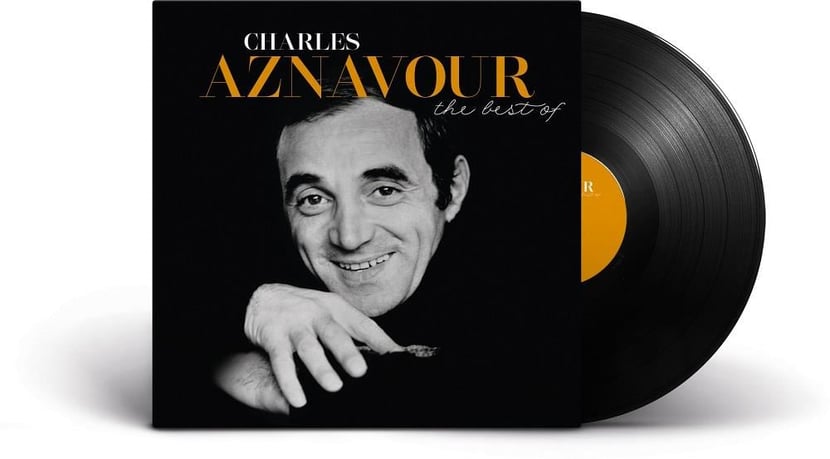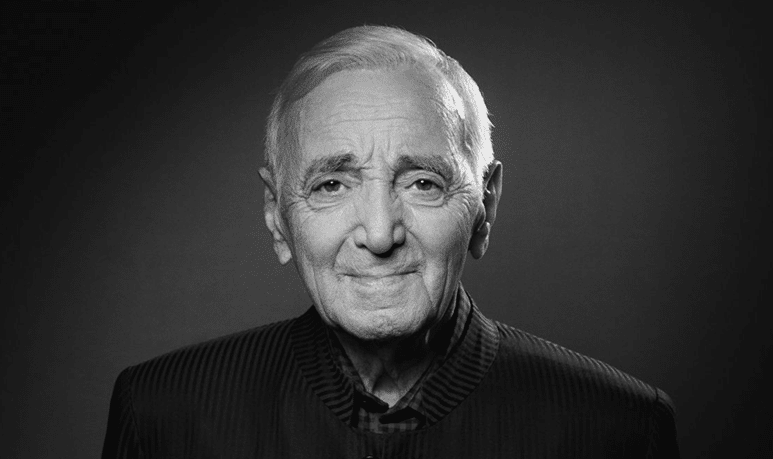He would have been 100 this year. Charles Aznavour is at the heart of a biopic directed by Grand Corps Malade and Mehdir Idir and starring Tahar Rahim. It’s a chance to revisit a mythical destiny, carried by a unique voice and songs that alone reflect France’s musical heritage.
It’s an event film. On Wednesday 23 October, the biopic Monsieur Aznavour was released in cinemas. Directed by slammer, poet and author Grand Corps Malade and director and screenwriter Mehdi Idir, the film lasts just over two hours and stars Tahar Rahim in the title role. The actor, known for his films Un prophète (2009), Samba (2014), Désigné coupable (2021) and the series Le Serpent (2021), delivers an impressive performance. He succeeds in the crazy challenge of getting into Charles Aznavour’s skin thanks to a lot of hard work on his voice (the actor is not dubbed), his body language and his emotions. After all, the singer’s life was not all glitz and glamour.
Quite the contrary, in fact. In keeping with the wishes of Charles Aznavour himself, who was close to Grand Corps Malade when he approached him with the idea for the biopic before his death in 2018, the film focuses on the artist’s early life. A difficult beginning, aptly recounted by the two directors with the support of the late singer’s family.

Hope and the will to succeed
Charles Aznavour was born in Paris in 1924 to Armenian parents. They had stopped over in France while waiting for a visa for the United States. The family, who had welcomed a baby girl a year earlier, finally stayed in France. They opened a restaurant in the 5th arrondissement where the father, a former baritone, sang for exiles from Central and Eastern Europe alongside the mother, an actress. Charles grew up in a home frequented by many artists.
A few years later, his parents enrolled him at the École des enfants du spectacle, where he showed a desire to become an actor. As an adolescent, he was hired at the Casino de Paris and the Alcazar in Paris. The budding singer and actor saw Maurice Chevalier there and had great admiration for Charles Trenet.
When war broke out, Charles joined a theatre company that gave shows in the occupied zone. During this dark period, the family hid Jews and Armenians in their Paris flat.
After several scenes with the pianist and driving force behind the École du Music-Hall, Pierre Roche, he took part in an RTF programme and met Edith Piaf. Together they left for the United States. Success came in varying degrees: Charles Aznavour made a hit with the songs he wrote, performed by other artists, but his own singing career struggled to take off.

Very close to Piaf, he lived in her shadow for eight years, being both her support act and her right-hand man. In the early 50s, while Gilbert Bécaud was setting his lyrics to music, Charles began to flirt with success. But he was controversial, with critics criticising his veiled voice for not being powerful enough, his short stature and his surprising body language. At the same time, he was involved in a serious car accident. Despite dire medical predictions, he escaped death after four days in a coma.
In Morocco, however, in 1953, he finally experienced the sincere applause of the public. After a tour of North Africa, he was hired at the Moulin-Rouge for a few months.
From small fees to small fees, from second-rate stages to too few prestigious stages, Charles Aznavour carved out an unstable place for himself, which he constantly had to legitimise as he was not unanimously acclaimed. In 1960, however, he signed to the Barclay label.
At the age of 36, he was finally acclaimed for his song Je m’voyais déjà, which depicts the portrait of an artist struggling to realise his dream. After years of hardship and two divorces, his hard work and passion finally paid off.
It is this life that the biopic Monsieur Charles is essentially about. It’s about a fame that has to be earned and proved, a determination that must not be mixed with despair, and a resilient determination to finally be in the spotlight.
Success at last
The rest is history. He scored one hit after another in the 60s, with a number of songs that will live long in the memory: Les Comédiens (1962), Hier encore (1964), For Me Formidable (1964), La Bohème (1965) and Emmenez-moi (1967).
His songs are nostalgic, melancholy, full of life, perfectly written and truly universal. He was inspired by love, friendship and the Paris of yesteryear. Many of his songs are performed in several languages, to appeal to everyone. Nine in all. He brought New York to its feet and definitively established himself at the top of the bill.
In 1972, his politically committed song ‘Comme ils disent’ (As they say) dealt with homosexuality and revealed Charles’s commitment to the cause. This was followed by Les Plaisirs démodés, Mes emmerdes, The old fashioned way and She, which reached number 1 in the UK charts. In all, more than 1,200 of Aznavour’s songs were offered to the public.

The following years were marked by a number of tragedies. First, the death of his son Patrick in 1976, aged 25. Then there was the earthquake that struck Armenia in 1988, taking the lives of more than 50,000 people. Although he had never been to Armenia, the disaster brought him back to his roots. Under his impetus, the song Pour toi Arménie brought together dozens of artists with the aim of donating the funds to solidarity associations. Various social, political and environmental themes have been tackled with finesse by the artist throughout his career, who has also appeared in dozens of films.
Although Aznavour became less frequent on stage from the 2000s onwards, even though he continued to tour, he continued to invest himself in music throughout the world, forging collaborations with big names in the music world and getting involved in a number of causes.
Charles Aznavour died on 1 October 2018, aged 94, but continues to live on in the hearts of his multi-generational fans.
Read also : Rediscovering Marilyn Monroe through her own objects
Featured photo : © DR















